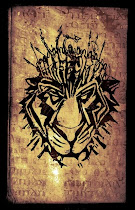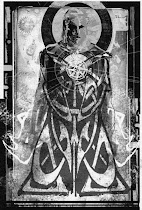Wednesday, October 29, 2008

Sarah and I had a conversation a day or two ago about heaven. And in this conversation we were discussing what things may continue in heaven. As we were talking, I came to the realization that much of the beautiful, inspirational things we humans do are actually in response to sin and death, and would therefore not be practiced in heaven. For instance, the medic who dies while treating a wounded friend and sheltering him from enemy fire with his own body... the relief worker who works day and night tending to battered refugees... the firefighters heading up the Twin Towers to save those trapped inside... the parent who goes without to ease her child's hunger... any number of things... Really, think about it, what use will heroism be in heaven? Will we really still experience self-sacrifice? So many of the things that we find inspirational in the lives of people will cease to be experienced.
Some things will likely remain.
Art.
Music.
Exploration.
Learning.
Gardening.
Things that simply revel in the beauty of God and the creation He has made! And when I look at my daughter's painting I recall her insistance that she does not want to be an artist... she IS an artist! And she wants to "make the world a more beautiful place with my art." And I look at her art and I think about her commenting on the beauty of the sunset the other night, her desire to soak up every ounce of Creation her senses will allow, her hunger to learn and understand the way the world works, the song in her heart oozing out all day long in whistles, hums, and little dances, and I think of how she just loves to get her hands dirty nurturing the little bits of Creation around her, saving tadpoles and watering plants. And when I think of all this I am actually overcome with a sense of wonder and joy at the great glory of our God! And I cannot wait for the day when we finally see the Creator face to face, and there will be no more need for heroism or sacrifice, and I can simply enjoy these simple yet profound pleasures with my daughter, rejoicing in the glory of the Creator for all time! That will be a wonderful day!
Saturday, October 18, 2008
Tuesday, October 14, 2008
Ideas Have Consequences, by Richard Weaver is probably one of the most insightful books I have read concerning the philosophy of relativism and truth. It's not an easy read, though at 187 pages it is not too long. Weaver makes you think if you're going to digest his book. He wrote the book in 1948, looked at the philosophical landscape around him, and foretold where our society would be headed in the generations to come. And the cool thing (and the sad thing) is that he was exactly right on with his predictions. He speaks about how morality will become more and more relative. Truth will be seen as subjective, changing from person to person. Words will cease to have the clear interpretation they once had. (A president questioning what "the meaning of word 'is' is," comes to mind.) And even personal property rights will give way to community authority "for the greater good of society". (Eminent Domain, anyone?) He goes on to talk about the cultural, societal, and moral impacts that this will likely have if followed to its logical conclusion. And the whole process is driven by us cutting the anchorlines of transcendental truth in the name of naturalism and the Enlightenment. He makes a strong and compelling case for a return to absolute truth and reality from a completely philosophical standpoint.
The Lord of the Rings Trilogy, by J.R.R. Tolkien is, in my thinking, the greatest epic of fictional literature authored in recent times. It is a beautifully intricate world of panoramic proportions. (Although the movies did fairly well, they still don't compare to the books... as is often the case in such situations.) The themes of heroism, hope, self-sacrifice, honor, virtue, good & evil, courage, friendship, humility, and all the great virtues possible in the human constitution run throughout this trilogy in a multi-layered tapestry of language and imagery. Something that I love about Tolkien's story is that it gets horrific and seemingly hopeless right before the end and the dawning of hope. This is a story that truly captures the maxim, "It's always darkest just before the dawn." And when it is all said and done, one of the characters, Samwise Gamgee, sees a long-lost companion whom he had presumed dead and gone. Upon seeing him Sam asks, "Is everything sad now going to come untrue?" That is perhaps one of the most beautiful quotes in all of literature to me because it captures the hope of the gospel in its few words. Anyway, that's why I recommend reading this trilogy.
Again, feel free to click on the links to the left if you'd like to see a little more about these books. The link will take you to reviews and information for the books on Amazon.com.

